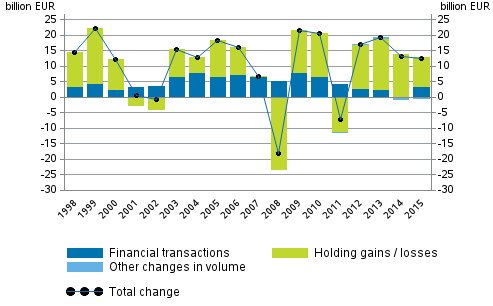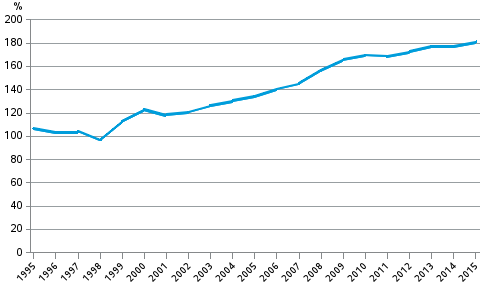1. Holding gains contributed the majority of the growth in households’ net financial assets in 2015
Households’ financial assets grew by EUR 13 billion during 2015 rising to EUR 281 billion. A majority of the growth in financial assets came from holding gains. This was particularly caused by the continued rise in stock market prices. Altogether, EUR ten billion was generated in holding gains, while households’ net investments in financial assets amounted to EUR three billion. Holding gains were now generated for the fourth year in a row.
The overall development of households’ financial assets and liabilities continued as favourable in 2015. The difference between financial assets and liabilities, i.e. net financial assets, continued growing for the fourth year in a row. As households' borrowing amounted to EUR five billion in 2015, net financial assets grew by over EUR seven billion and amounted to close on EUR 134 billion.
Figure 1. Change in financial assets of households, EUR billion

Even though households’ net investments as a whole in all financial assets increased in 2015, their level has in recent years been clearly behind the figures seen at the beginning of this century. Households' net investments in quoted shares were negative. They decreased by more than EUR 0.5 billion. The decline now continued for the second successive year. The popularity of mutual fund shares also petered out, even though net investments in them continued increasing by close on EUR 0.5 billion.
In terms of deposits, the shift in focus from fixed-term deposits to cash deposits, that has been visible for a couple of years, continued but at a slower pace. Households withdrew EUR 1.5 billion from fixed-term deposits in 2015, while their cash deposits increased by more than EUR two billion.
Overall, households’ financial assets amounted to EUR 281 billion at the end of 2015. Of these, EUR 80 billion were deposits, EUR 72 billion unquoted shares and equity, EUR 59 billion insurance and pension technical reserves, EUR 32 billion quoted shares, and EUR 20 billion mutual fund shares. The value of other financial assets held by households was EUR 18 billion. Households’ shares in housing companies are not recorded in financial accounts as households’ financial assets.
Households' debts continued to grow at the same pace as in the previous year. Households’ loan debts increased by EUR five billion during 2015, reaching nearly EUR 138 billion at the end of the year. The indebtedness rate, i.e. the proportion of loans relative to disposable income, rose by 3.1 percentage points to 124.6 per cent. As a result of holding gains, households' financial assets increased more than their debts. Thus, households' net financial assets grew by over EUR seven billion to close on EUR 134 billion
1.1. General government’s financial position improved slightly
General government's financial position improved by over EUR two billion. Net financial assets rose to EUR 114 billion in 2015. This is the case despite the fact that the net financial assets of central government declined by EUR 5 billion. The fact that all general government was able to maintain their financial position is explained by an increase of over EUR eight billion in the financial assets of employment pension schemes that belong to social security funds. Local government's net financial assets contracted by EUR one billion.
The weakening of the central government's balance sheet position, which started in 2008, continued in 2015 even though only half as sharply as in the previous year. During 2015, central government's net financial assets contracted by EUR 5 billion to EUR -63 billion. Central government debt increased mainly on account of new bonds it issued. In terms of financial assets, a partial culprit for the weakening net financial position was the unfavourable development of the value of shares owned by central government. Good EUR 0.5 billion was generated as holding losses from these shares.
During 2015, net financial assets of employment pension schemes increased from EUR 170 billion to EUR 180 billion. The growth in employment pension schemes' net financial assets was caused by considerable holding gains. The fact that the market value of quoted shares and fund shares owned by employment pension schemes grew by more than EUR six billion was mainly responsible for the growth in net financial assets in the sector.
Employment pension schemes' net investments in financial assets grew from zero in 2014 to EUR 1.5 billion in 2015. In 2015, a clear shift occurred in employment pension schemes' investments. They removed assets from quoted shares by nearly EUR two billion in net. Net transactions in debt securities also turned negative. Investments in mutual fund shares only grew by close on EUR 0.5 billion, while deposits increased by over EUR four billion
1.2. Non-financial corporations increased debt financing
Non-financial corporations' debt financing grew during 2015 by EUR nine billion. Debt financing refers to the total of loan debts and financing in the form of debt securities. Over the year, non-financial corporations' debt financing increased from EUR 214 billion to EUR 223 billion. Almost all of the growth in debt financing came from loan debts while debts in the form of debt securities only increased by EUR 0.3 billion.
1.3. Growth in domestic mutual funds continued
Domestic mutual funds grew by a total of EUR 14 billion in 2015. A majority of the growth, nearly EUR nine billion, was generated through net investments, while the rest consisted of holding gains from funds. Financial and insurance corporations, in particular, invested in investment funds during the year.
1.4. Foreign holdings in Finnish quoted shares rose to 53 per cent
Foreign net investments to Finland decreased by EUR three billion. The biggest decreases were seen in deposits and debt securities, while the amount of loans increased considerably. Changes in deposit assets and liabilities are mainly linked to operations between financial institutions.
Foreign investors increased their holdings in Finland also in quoted shares last year. At the end of the year, the value of foreign share holdings in Finnish quoted shares was EUR 93 billion. The proportion of foreign ownership of the value of Finnish quoted shares increased by three percentage points to 53 per cent.
Of foreign investment instruments, particularly deposits and also mutual fund shares were favoured by Finns in 2015. At the end of the year, Finnish units owned EUR 64 billion worth of foreign quoted shares and EUR 84 billion worth of domestic quoted shares. Finns owned EUR 90 billion in foreign fund shares while the level for domestic fund shares was EUR 85 billion. The growth of over EUR five billion in foreign fund shares owned by Finns was mainly generated through holding gains as actual net investments of domestic investors in foreign funds was only good EUR one billion.
1.5. Private sector debt increased
Private sector debt grew by EUR 15 billion last year. Simultaneously, the GDP share of the debt rose by 3.9 percentage points to 181.3 per cent. Private sector debt comprises the loan debts and debts in the form of debt securities of non-financial corporations, households and non-profit institutions serving households.Figure 2. Non-consolidated private sector debt as percentage of GDP

�
Source: Financial Accounts, Statistics Finland
Inquiries: Henna Laasonen 029 551 3303, rahoitus.tilinpito@stat.fi
Director in charge: Ville Vertanen
Updated 14.7.2016
Official Statistics of Finland (OSF):
Financial accounts [e-publication].
ISSN=1458-8145. 2015,
1. Holding gains contributed the majority of the growth in households’ net financial assets in 2015
. Helsinki: Statistics Finland [referred: 19.4.2025].
Access method: http://stat.fi/til/rtp/2015/rtp_2015_2016-07-14_kat_001_en.html

